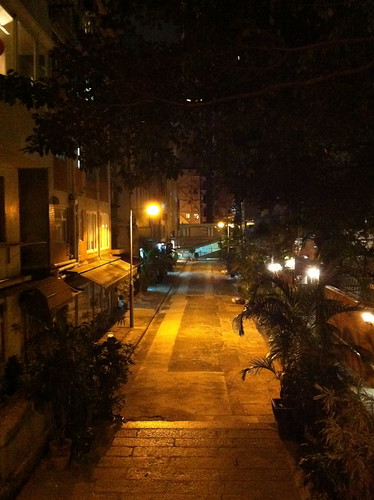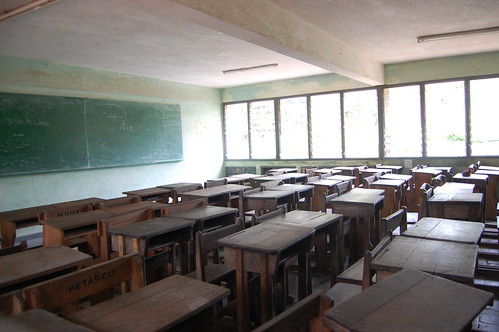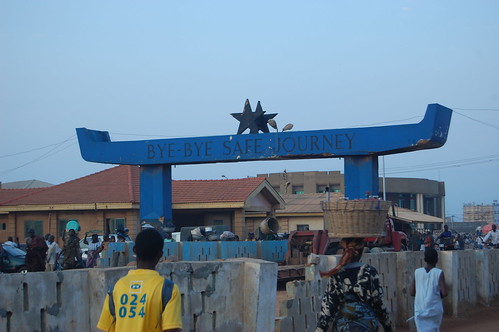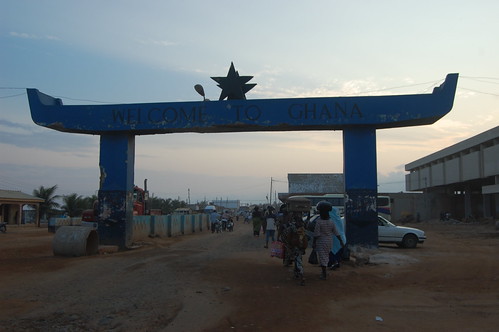
Home is a funny thing. I have thought and written about it enough that I now bore myself when it comes up, and though it may take me a bit longer than most to say where home is, I have decided that there is no easy answer, for anyone, anywhere, to say
what home is. But I know there are shades of home, levels and zones of comfort that grow on you, so that even after just two weeks in one place, when you go to another, you find yourself wanting to go back. Back home.
That’s how I felt as I slid back into Ghanaian territory a few days ago, in spite of the officer who yelled at me for trying to take a photo of the border crossing. Maybe home isn’t a place you--or at least I--ever reach, but at least you can feel it when you’re moving towards it, a few sometimes grimy steps closer to what you know, even if you’ve only known it for two weeks. After preferring taxis for most my time in Ghana, a tro-tro (a van with lots of people in it) was suddenly and pleasantly familiar, certainly moreso than whatever means of le transport I could find in Togo. Then sitting in the tro-tro, knowing where I was going, knowing even where I would be sleeping that night, felt like I was eight or nine again, back from a family vacation again, coming out the doors at Kai Tak, walking into our apartment, floors always freshly cleaned while we were away from home.
There is a suburb in the northeast of Accra called Achimota, far enough from the center of town that taxi drivers snarl a little when you tell them that’s where you want to go, before invariably saying, “Traffic!” and bumping up the fare a few cedis, at least for us
obrunis. Achimota is home to the African Brewing Company, which produces that universal liquid form of sustenance called Guiness, as well as Star, one of the two major local brews. A nearby roundabout, ABC Junction, is named after the brewery, though it is not so much a junction or a roundabout as it is a good-luck-to-you convergence of traffic from all imaginable directions on roads yet to be paved. Coming from Accra, if you survive a left turn at ABC, it will take you down a small road, past a mysterious Chinese Recovery Clinic, before a right turn down an alley leaves you at the foot of the Telecentre Guesthouse. Or, as hundreds of Unite For Sight volunteers have called it for varying lengths of time over the last few years, home.
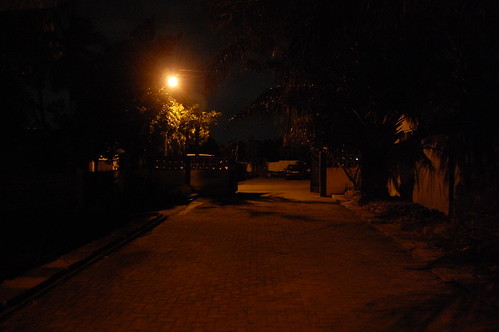
It’s hard to say what stood out so much about Ghana, or at least Accra, but that gives the mistaken impression that it was unsatisfying, that I flew all this way to a part of the world I’d never been to before and can’t really show much for it. Though we travel almost by definition to seek out what is exotic, it felt reassuring and maybe even more worthwhile to find myself in a part of the world I’d never been to before and not OMG my way through each day. That which was at all exotic, at all weird and previously unheard of, was really not so much, or else how did it become so familiar, so fast? It takes but a few days to get used to sucking a milkshake out of a bag (genius), or water out of a bag (less genius), or really just sucking anything out of a bag. It takes even less time to find yourself stuck in an Accra traffic jam, sticking your hand out of the window with some pesawas to buy whatever random crap--and it is a lot of crap, and it is very random--the street vendors have to offer. They are street vendors like anywhere else in the world. In Accra, they just happen to actually be on the street, in the middle of the street, running up and down the street to give you change once traffic starts moving again. And after all, everything they sell is, kind of like me, made in China at some point further up the manufacturing stream.

That which was familiar was intensely, intimately, familiar. Ghana, where every little chop bar offers this one dish, jollof rice and chicken, which is only one or two spices removed from my family’s consensus favorite meal in the Vietnamese suburbs of Sydney: 炸雞紅飯. Ghana, where every young man is wearing either a soccer or basketball jersey, often the ubiquitous Samsung written on Chelsea blue, but even, every now and then, “Starbury” emblazoned across the front. And Ghana, where every few blocks on small side streets a couple guys have set up refrigerator-sized speakers that blast out more 90s RnB than I have heard, at least outside of my own earphones, since about the eighth grade. It’s on the streets and on the radio, always, the kind of music I know better than any other: Joe, Dru Hill, Blackstreet, K-Ci & JoJo, Brandy, Monica, and other random songs I can karaoke by heart from soundtracks of movies I never saw because
Set it Off and
Hav Plenty were not ever going to be released in the theaters where I grew up.
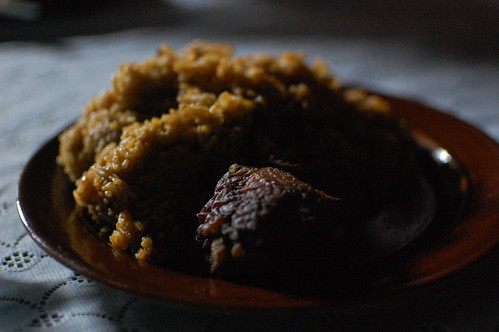
Oh and Ghana, where girls get in the club for free but guys pay a small fortune just to enter, never mind the overpriced drinks. Home.
The last couple nights at the Telecentre, when most of the other volunteers had already left, I hung out at night on the couches in the lobby, watching the surprisingly good movie channel and chatting with Naomi, one of the girls you might call a night receptionist but really just sleeps on the couch, watches the movie channel (or Africa Magic!), and chats with volunteers. Turning 21 next week, she told me how she had for the first time gone to a club just a few days before, and how happy she had been to dress up and dance and just enjoy herself. She’s studied business in college but now wants to start over and switch to nursing. She is single and lives at home with her mother. So basically, that
Times article last week on twentysomethings that everyone who is twentysomething read the first couple pages of is almost just as much about Naomi as it is about me, or you.
At one point, maybe because
American Pie was on, and later another movie where Heather Locklear falls in love with a much younger surfer dude in Hawaii, Naomi started talking about relationships and lectured me about still being single at 27, which conveniently happened to be the same age as the surfer dude. She told me to remember some deep, if basic, truths about people, and love, and though it’s all been said before, it never hurts to be reminded.
That perhaps best describes my time in Ghana, where the other volunteers were all still in or just out of college, which is not a huge difference in years, but can sometimes feel like a different era altogether. Where I feel like I’m coming to the end of--or at least slowing--my hopscotch around the world, most of the others seemed to be just beginning. Where, a world away from home, I sought comfort in the familiar, others seemed to relish the strange and unexpected.
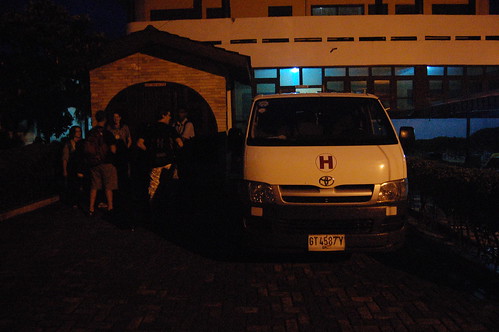
When the other volunteers were still around at the Telecentre, one of the other movies that came on was
Under the Tuscan Sun. I like Diane Lane, but probably not quite enough to have watched
Under the Tuscan Sun under any other circumstances. And yet sitting around on those couches with my newest of friends, the ceiling fans rocking gently overhead, the movie’s less than subtle theme of holding on to childish excitement and passion struck a chord. Twenty seven is too young, far too young, to need to be reminded of childish excitement and passion, but when everyone around you is at least five or six or seven years younger, it strikes a nervous chord; when you are less than two months from signing away your life to a law firm, it strikes a nervous chord.
I can’t say I’ll miss the horrendous gridlock, or the cold showers, or drinking water out of a bag. I can’t tell you that Ghana changed me in any major way, or that the experience has somehow altered the course of my life, that I am heading anywhere different today than I was a month ago. But on that long road to home, on this journey whose uncertain destination I am finally starting to embrace, my time in Ghana will be like one of the many speedbumps we rolled over on our daily van rides to those outlying villages in need of some basic eye care. It will be a place where from my hurried pace I slowed down, gently eased up and over a short break in my stride, and was reminded of the dangers of speeding through life.
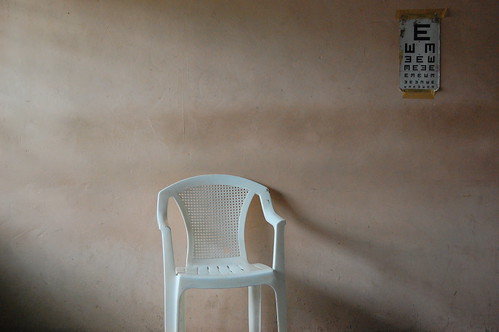
If I can feel at home in Ghana, I suppose I can feel at home anywhere.
